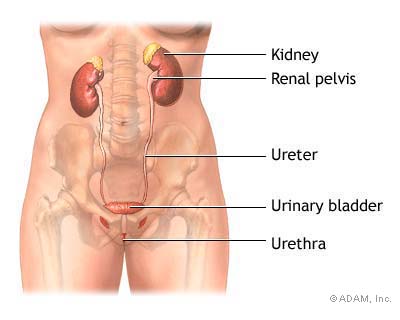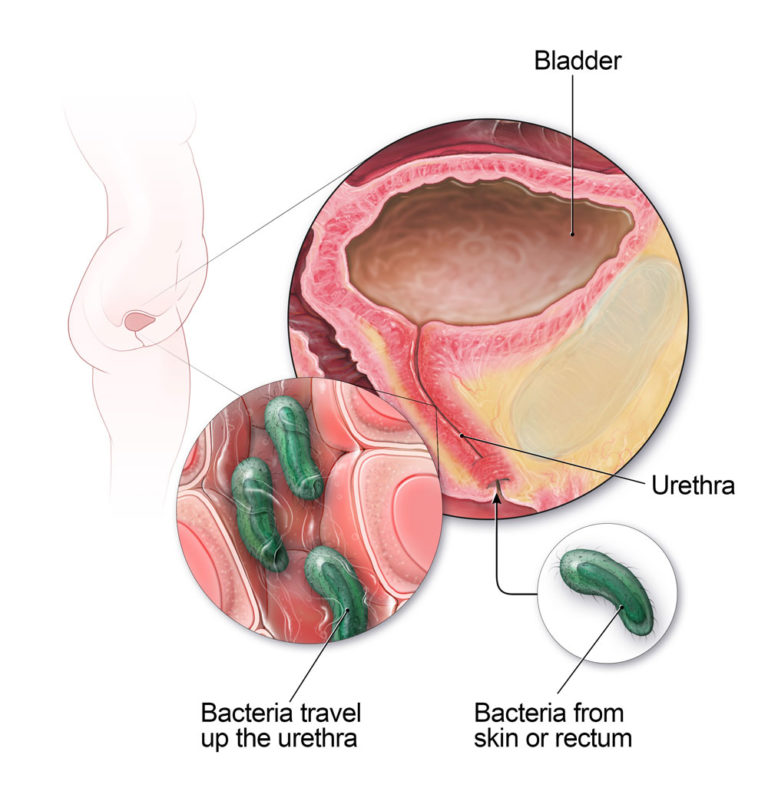Urine Infection in women is very common (almost 50% women face it) in India & worldwide. Here are 16 Tried & Verified Home Remedies to control bacterial overgrowth and prevent urine infections.
When I found out that 50% of women face urinary infections in their lifetimes, I was simply blown away! That’s a lot of inconvenience to a lot of women.
That’s when we decided here at VitSupp that everybody needs to know more about this.
To know what this is, how to deal with it, and how if we act early, take a few precautions & use a few simple home remedies we can avoid antibiotics (the popular method of UTI treatment).
Repeated usage of antibiotic may cause an antibiotic-resistant bacterial infection. Therefore, more and more women look for Indian home remedies to keep infection at bay. Primarily because research has shown that repeated use of antibiotics makes it difficult to control a previous UTI.
So if you have friends, girlfriends, sisters who can benefit, share this with them so that they know what to do when faced with this.
Contents
- Urinary Infection in Women
- Urinary Infection symptoms in females
- Reasons for Urine Infection in Females
- Urinary Infection during Pregnancy
- Types of Urine Infection in Women
- Why Indian Home Remedies for Urine Infection in women
- 16 Indian Home Remedies for Urine Infection
- Ayurvedic Remedies for Urine Infection
- How to control Urine Infection Naturally
- Frequently asked questions on Urine Infection
- REFERENCES:
Urinary Infection in Women
Women are predisposed to getting a urine infection as they have shorter urethras compared to men.
Shorter urethras of women make the path to the bladder smaller for the bacteria to reach. Besides, that female’s urethra is closer to the rectum than men’s urethras.

That again means there is a shorter distance for the bacteria to travel from the anal area to the urethra.
The two most common causes of this to happen are improper wiping and sexual intercourse.
Therefore, hygiene does play a role in urinary infection in women.
Urinary Infection symptoms in females
The key urine infection symptoms in women are as follows:
- A burning feeling during urination
- A frequent and intense urge to urinate, even though the bladder is empty
- Cloudy, dark, bloody, or strange-smelling urine
- Pain or pressure in either side of the lower back and the lower abdomen
- Fever or chills accompanied by the above symptoms may be a sign that the disease may have reached your kidneys
- Nausea and Vomiting
- Cramps or pain in the lower abdomen
- Pain during sexual intercourse
- Blood or pus in the urine
- Chills or fever
Reasons for Urine Infection in Females
The primary reason for Urine Infection in females is Bacteria. Apart from a bacterial infection in urine, some other reasons could be viruses, fungi, and other parasites.
These organisms enter the tract either by the lower part of the urinary tract (through the gap of the female genitals) to the bladder or thru the blood to the kidneys.
1. Bacterial Infection in urinary tract: The primary reason for urine Infection in Females
Bacterial infections of the lower urinary tract (primarily bladder) are common among women mainly due to Escherichia coli.

Role of E Coli Infection in Urine
A bacteria known as E. coli (Escherichia coli) is the culprit in at least 90% of uncomplicated urinary infections cases.

The natural habitat of these bacteria is in the bowel (colon) and around the anus.
While their presence in the gut is natural, they may sometimes make their way to the Urethra, travel in, multiply and cause infection.
Though the urine is sterile, urinary infection occurs when bacteria get into the urine and begin to grow. The infection usually starts at the opening of the urethra, where the body releases urine outside.
Usually, urinating flushes the bacteria out of the urethra. However, if there are a large number of bacteria, that may not happen. In that case, the body has compromised capability to eliminate the bacteria.
In such a case the bacteria may travel up the urethra to the bladder, where they can attach to the walls and multiply causing the bladder infection.
The infection can spread further as the bacteria move up from the bladder via the ureters. If they reach the kidney, they can cause a kidney infection which can become a severe condition if not treated promptly.
2. Urine infection or UTI caused by Viruses:
The herpes simplex virus type 2 (HSV-2) may infect the urethra, making urination painful and emptying of the bladder difficult.
Other viral UTIs, such as bladder and kidney infections, do not usually develop unless a person’s immune system is not functioning properly (for example, by cancer, HIV/AIDS, or use of a drug that suppresses the immune system).
3. Urine infection caused by Fungi:
Certain fungi, or yeasts, can infect the urinary tract. This type of infection is known as a yeast infection (fungi can also cause inflammation of the vagina).
The fungus Candida is the organism most likely to cause urinary tract yeast infections (candidiasis).
Candida frequently infects people who have an impaired immune system or a bladder catheter in place. Fungi and bacteria may affect the kidneys at the same time.
4. Urine infection caused by Parasites:
Some parasites, including certain types of worms, can influence the urinary tract.(2)
- Trichomoniasis, a sexually transmitted disease that can cause a copious greenish yellow, frothy discharge from the vagina in women. Occasionally, the bladder or urethra becomes infected. Trichomoniasis can infect the urethra in men. It usually causes no symptoms in men.
- Schistosomiasis, an infection caused by a type of worm called a fluke, can affect the kidneys, ureters, and bladder. Persistent bladder schistosomiasis often causes blood in the urine or blockage of the ureters and may eventually result in bladder cancer.
- Filariasis, a threadworm infection, obstructs lymphatic vessels, causing lymph fluid to enter the urine (chyluria). Filariasis can cause significant swelling of tissues (elephantiasis), which, in men, may involve the scrotum.
Urinary Infection during Pregnancy
Urinary infection in women are quite common during pregnancy. During pregnancy the symptoms of infection are much more pronounced as the growing fetus can put pressure on the bladder and urinary tract.
The physical changes takes place during pregnancy. Just after six weeks pregnancy, almost all pregnant women experience ureteral dilation. During this stage the urethra expands and continues to expand until delivery. This traps bacterial micro-organisms and may cause urine to leak.
The urine in the bladder may become still to allow bacteria to grow. At the same time pregnant woman’s urine gets more concentrated with certain types of hormones. This again encourage bacterial overgrowth and lower your body’s ability to fight off “bad” bacteria trying to get in.
1. Is Urine Infection Dangerous During Pregnancy?
Urine infection or any other infection for that matter could be dangerous during pregnancy for you and your baby. That’s because infections increase the risk of premature labor.
Therefore, you need be extra cautious during your pregnancy. If you suspect Urine Infection, let you doctor know asap. If you’re prescribed antibiotics, do take it on time without fail until you finish the complete course.
2. What you can do to prevent UTI during pregnancy
Here are a few things you can do to avoid urine infection during pregnancy:
- Emptying your bladder frequently, especially before and after sex
- Go for cotton underwear
- Change your underwear frequently, do not allow it to be wet
- Avoid douches, perfumes, or sprays
- Drink plenty of water to stay hydrated and clean your system
- Avoid strong soap in your genitals area
Types of Urine Infection in Women
Bacterial infection in urine can occur in the urethra, bladder, or kidneys.
1. Lower UTI and its Treatment
Infection of bladder or urethra is called Lower UTI.
Lower abdominal and flank pain are common symptoms of urine infection in women. If you have pain or discomfort while urinating, it indicates lower urine infection or bladder infection.
Bladder infection is also known as Dysuria (Dysuria is the medical term for pain or discomfort when urinating. It indicates lower urine infection or bladder infection.)
With treatment of bladder infection through antibiotics, about 30 to 40% of urine infection in women can recur within six months. The antibiotic treatment to address bacterial infection, which seems to work at first, does not produce a lasting cure.
Therefore, more and more women look for Indian Home Remedies to keep Urine infection at bay as repeated use of antibiotics makes it difficult to control a previous UTI.
2. Upper UTI and its Treatment
However, if a fever accompanies your urine infection, it is a telltale sign of an advanced and upper UTI that has probably reached the one or more of your kidneys.
Back pain in the sides or groin pain and lower Abdominal pain accompanies Upper UTI or Urine infection of kidneys.
WARNING!: It is the more severe kind of urine infection in women. Now is the time to visit your physician ASAP. And this is probably the time that you WILL need antibiotics.
Visit your doctor without any delay.
Your physician will prescribe appropriate antibiotics.
Why Indian Home Remedies for Urine Infection in women
With treatment of bladder infection through antibiotics, about 30 to 40% of urinary infection in women can recur within six months.
The antibiotic treatment to address bacterial infection, which seems to work at first, does not produce a lasting cure.
Hence Indian Home remedies for urinary infection are getting popularity primarily for lower Urinary Tract Infection.
However, if you do use antibiotics, it is important to take a high quality, high potency probiotics to replace the beneficial bacteria that will be killed by the antibiotic. Some physicians may, and some may not prescribe probiotics. If yours does not, many probiotic formulations are sold as OTC supplements too.
Don’t trade your urine infection for a stomach disorder.
16 Indian Home Remedies for Urine Infection
Indian Home Remedies for Urinary infection in females are very effective for urethra and bladder. Below are 16 top Indian home remedies for UTI along with some lifestyle change requirements:
1. Stop all sugar:
Sugar is one of the leading causes of lowered immunity that we see today.
You must remove all refined and processed foods, along with all “diet” and “sugary” soft drinks fruit drinks.
Completely avoid prepackaged desserts like ice cream and mithai, which is laden with sugar, chemicals, and colors.
All they do is raise your blood sugar, overwork your liver, kill your gut flora and give you constipation and allergies. What it only means is that sugar disturbs your digestive and waste disposal system.

2. Add more salt to your diet:
When a person suffers from urinary infection, the body tries to rid itself of it by urinating more.
As explained earlier the body gets rid of mild infection by the act of urination. But when you urinate more, you also lose more minerals. It is important to add back minerals in the form of salt.
But not the regular toxic white stuff which is only one mineral – sodium chloride.
We are talking about the pink Himalayan crystal salt known to have up to 84 minerals.
Another action accomplished by the Himalayan salt drink is that it alkalizes the body and neutralize the acid in the urine, which destroys the bacteria in your urinary tract.
The same acid neutralization also works to relieve the burning and pain sensation on consequent toilet visits.
3. Drink Lots of Filtered Water:
A 2013 study conducted by the University of Texas Southwestern Medical Center at Dallas has found that chronic low fluid intake may be a primary factor in the occurrence of urine infections.
So drink filtered water throughout the day to assist the body in eliminating urinary infection. Do not forget to all a little natural Himalayan salt to replace minerals.
4. Curcumin: Natural Antibiotics for a Urine Infection
Curcumin is the active ingredient in the yellow spice turmeric. It is anti-inflammatory and is better than pharmaceuticals at fighting off infection and inflammation.
5. Apple Cider Vinegar
Hippocrates, the Father of Modern Medicine, used Apple Cider Vinegar to treat almost every ailment.
Apple Cider Vinegar made traditionally is an antiviral, antibacterial and anti-fungal remedy to multiple health conditions.
Beware of the cheap versions available in the Indian Market.
Go for only Braggs Organic Raw Apple Cider Vinegar. Bragg ACV is raw, unpasteurized and contains live enzymes! It can also recolonize your body with beneficial bacteria.
6. Vitamin D3
A Swedish study published in the PLoS One journal (The year 2011) found that vitamin D protects against urine infections. The scientists wrote:
“In the light of the rapidly growing problem of resistance to common urinary tract antibiotics, we suggest that vitamin D may be a potential complement in the prevention of UTI.
Determining the vitamin D status of individuals with a history of UTI may be of importance to evaluate their ability to fend off intruding bacteria.”
Vitamin D in the form of 25-hydroxyvitamin D3 induces an increase in the naturally occurring antimicrobial peptide cathelicidin in the urinary bladder.
Using Vitamin D to fight off UTI has a significant advantage over antibiotics. Antibiotic kills off beneficial bacteria while in action, however, Vitamin D produces the anti-microbial peptide ONLY at the site of infection while leaving the beneficial bacteria of the body unharmed.
7. Probiotics & Fermented Foods:
Probiotics are of great value as the first line of defense against any illness.
When it comes to any kind of urinary infection, especially the recurrent infections, probiotics can be very helpful.
How:
The beneficial bacteria from the probiotics can recolonize the bladder and prevent recurrent infection.
To obtain the largest number of beneficial bacteria, consume fermented foods like kefir, homemade probiotic yoghurt, kimchi, raw cheese from organic raw milk and of course sauerkraut.
And the best part is:
That these homemade fermented foods can provide you with therapeutic levels of beneficial bacteria compared to commercial probiotics. That too for free!
UPDATE: Probiotics may prevent bacteria from sticking to the bladder and causing infection. Both Lactobacillus rhamnosus and L. fermentum strains have been shown to eliminate the bad bacteria in the urinary tract.
8. Cranberries, blueberries, and lingonberry
Cranberry and its related berries are found to have protecting properties against urine infection.
These fruits contain compounds known as tannins (or proanthocyanidins). Tannins could stop E. coli bacterium from adhering to cells within the tract, thereby inhibiting infection.
Fruit crush of berries is that the best-studied home remedy for UTIs. Some studies have indicated that fruit crush could decrease the amount of symptomatic UTIs, particularly for girls with repeated tract infections.
As per a study conducted by Boston University in the USA, Kalpana Gupta says “that consuming one 8-ounce (240 ml) glass of cranberry juice a day reduces the number of times women suffer from repeat episodes of symptomatic UTI and avoids chronic suppressive antibiotics.”
9. Acupressure
There are 5 points in Acupressure that can give relief when suffering from a UTI.
| Point | Effect | Indications |
| Bladder 23 | Increases circulation to the urinary tract and reproductive organs. | UTI, lower back pain, vaginitis. |
| Point Bladder 28 | Master point for the bladder. | Urinary infection |
| Bladder 60 | Increases circulation to the urinary tract and reproductive organs. | Urine infection |
| Four Gates | Urine infection/ UTI /Urinary infection | |
| Kidney 3 | Strengthens the bladder and kidneys and increases the circulation to the reproductive organs. | UTI, Bed-wetting, and vaginitis. |
Bladder 23:
How to activate the Bladder 23 point
Gently massage these points while asking the person you are working on for feedback about your pressure and motion. Adding focused contact to these points during any massage is a great way to activate the healing potential of Bladder 23 for yourself, your friends and family. Get someone to do it for you, or better yet get in touch with an acupressure therapist.
10. Practice Good Hygiene
Women should practice good personal hygiene.
- Women should wipe from front to back, especially after a bowel movement. This ensures that bacteria doesn’t get into the urethra.
- Take showers instead of tub baths; avoid hot tubs/Jacuzzis
- Clean your genital area prior to sexual intercourse & expect your partner to do the same.
- Avoid using feminine hygiene sprays, which may irritate your urethra
- Avoid using spermicides or condoms with spermicide.
It’s also important to wear loose-fitting clothes and underwear, which allows air to keep the urethra dry. Wearing tight jeans or material like nylon can be problematic because moisture can be trapped, allowing bacteria to grow.
11. Olive Leaf Extract (OLE)
Olives are a staple of mediterranean diets. However it is the olive leaves that come with great medicinal benefits. For 100’s of years researchers have studied them for their broad-spectrum action against fungi, protozoa, viruses and bacteria. So yes olive leaf extract is an antifungal, antiviral and an antibiotic. The main active ingredient in olive leaf extract is oleuropein. It is extremely effective at killing the E.Coli (Escherichia coli) & Pseudomonas aeruginosa bacteria, which are the main culprits of UTI’s. Most patients can find complete relief in approximately 24 hours with the OLE. And if your urine infections are a recurrent problem stay on a maintenance dose of olive leaf extract, until you correct you gut flora with probiotics and fermented food.
When purchasing an OLE supplement, you will need to make sure that the brand you buy has an oleuropein content (the main ingredient needed to treat a UTI) of at least 20-25% (300 mg’s of pure oleuropein). Anything less will not be effective enough.
12. Vitamin C
Vitamin C acidifies the urine and inhibits the growth of E. coli and enhances immune function. A 2007 study evaluated the role of supplementing 100 mgs of vitamin C per day in urinary infection treatment during pregnancy. Researchers found that vitamin C treatment for a three-month period was able to reduce urinary infections and improve the health level of the gestating women.
13. Garlic
Garlic is a known folk remedy which has proven anti-fungal and anti-microbial properties. A research team from India decided to look into the efficacy of garlic as a treatment for urine infections. They found that 56 percent of 166 bacteria strains isolated from the urine of people with UTIs showed a high degree of resistance to antibiotics. However, they also found that about 82 percent of these antibiotic-resistant bacteria strains were treatable with garlic extract. Antibiotic resistant bacteria probably result from repeated use of antibiotics for treatment of uti’s.
14. Clove Oil
Research published in Phytotherapy Research indicates that clove oil also has antimicrobial, antifungal and antiviral activity. Another clove oil benefit is that it possesses anti-inflammatory properties, and it’s used to relieve pain and promote healing.
15. Oregano Oil
Oregano oil is one of the most potent antifungal antibiotic, antivirals and even antiparasitic given to us by nature. Carvacrol is the active component of oregano oil. There are 800+ studies that reference carvacrol of oregano oil. So you can be sure that if is one of the best researched herbs.
Carvacrol from Oregano oil has been proven to reduce and even eliminate:
- Fungal infections like Candida
- Parasites
- Viruses
- Bacterial infections
- Inflammation
These properties of oregano oil make it a potent tool against urine infections.
16. D-mannose:
Almost 90% of all urinary infection is caused by e.coli bacteria. E. coli is not a pathogen. It is a normal part of healthy gut flora. It is a problem only when it is present in large numbers in a place where it is not supposed to be.
E. Coli is not supposed to be present in the Urinary Tract.
So how do some of us get the E.Coli in the urinary tract? It seems that personal hygiene habits play the largest role.
The human body is intelligent so mother nature must have planned for such events. After all the use of soap for hygiene is just 100 or so years old. Yes, the body recognizes the infection and attempts to flush them out via excessive urination.
Sometimes this is successful, other times when the E.Coli is too many in number, your body needs some extra help. You see the E.Coli has finger like tentacles which allows them to stick to the walls of your bladder and when in large numbers, even allows the E.Coli to travel to the ureter and kidneys.
However unfortunately for the E.Coli, D-mannose sticks to the E.Coli better than how it sticks to our cells. So when you take a lot of D-mannose powder, it spills into your urine and attaches to most of the E.Coli bacteria. This results in the bacteria to be literally washed away from your body via normal urination! Without any anti-biotics!
What is D-Mannose?
D- Mannose is a natuarlly occuring suagr found in pineapples and cranberries. It is also created by the human body.
body absorbs D-mannose much more slowly than glucose, and the D-mannose does not convert to glycogen or get stored in your liver. Only very small amounts of D-mannose are metabolized, so it doesn’t interfere with blood sugar regulation.
Most of the D-mannose is filtered through your kidneys and routed to your bladder, then quickly excreted in your urine. Meanwhile when you take antibiotics for a urinary tract infection (UTI), the good bacteria are killed along with the bad, which is why you can develop fungal and digestive issues after anti-biotics.
Ayurvedic Remedies for Urine Infection
Ayurvedic medicines easily and quickly treat urinary infection without any side effects. Popular Ayurvedic herbs known to treat urine Infections and other urinary diseases are:
- Urinary antiseptic and anti-adhesion herbs: these herbs are effective against major urinary tract pathogens namely E. coli, Klebsiella pneumonia, Pseudomonas aeruginosa and Enterococcus faecalis.
- Herbs are Juniperus spp., Vaccinium macrocarpon, Salvia officinalis, Punica granatum, Tribulus terrestris, Terminalia chebula, Ocimum sanctum, Cinnamomum cassia, Azadirachta indica and Ocimum sanctum.
- Bladder protectives that control bladder and protect from infections.
- Herbs are Equisetum arvense, Hydrangea petiolaris and Zea mays.
- Kidney care herbs:
- Herbs are Boerhaavia diffusa, Eupatorium purpureum, Agropyron repens and Berberis vulgaris
- Herbs for symptoms of benign prostatic hyperplasia
- favorite herbs are Serenoa repens and Prunus africana.
How to control Urine Infection Naturally
DO’s & Don’ts to control Urine Infection in women
- DO urinate when you need to do so; DON’T resist the urge.
- ALWAYS wipe from front to back to prevent bacteria from entering your urethra, when using toilet paper. Especially ladies.
- DO drink plenty of water.
- ALWAYS visit the toilet before and after sex.
- ALWAYS clean your genital area before sexual intercourse. Preferably with a mild soap.
- DON’T using feminine hygiene sprays. They encourage infection.
- ALWAYS take showers. Avoid hot tub baths. Avoid usage of Jacuzzi.
- DON’T drink alcohol. Alcohol is a strong irritant to the bladder and will send you to the toilet unnecessarily.
- DO reduce or eliminate caffeine. Avoid caffeine-loaded soft drinks and chocolate, along with tea and coffee. Caffeine like alcohol irritates the bladder.
- ALWAYS use only white unscented toilet paper. Avoid coloured, fragrant toilet paper. If possible use a bidet while washing on the pot.
- DO wear cotton garments. Cover all private areas with natural cotton only. Women should wear cotton underwear and try to keep their private parts dry and “ventilated.”. Men should go for loose boxer shorts.
- DO wear Loose-Fitting Clothes: Tight jeans or unnatural materials like nylon are harmful because moisture can trap in these and allow the bacteria to proliferate.
- FINALLY, women need to avoid spermicidal contraceptives, diaphragms and vaginal douching. These irritate the vagina and the urethra and can encourage uti’s.
Frequently asked questions on Urine Infection
Q1 I am suffering from Urine Infection during pregnancy is it harmful for baby?
Q2 How to cure Urine Infection during pregnancy with Home Remedies?
Q3: Is urine infection dangerous during pregnancy?
Q4: Will urine infection affect pregnancy?
Q5: Is urine infection symptoms of pregnancy?
Q6: How to reduce Urine infection during pregnancy?
Ans: A 2007 study evaluated the role that daily intake of 100 milligrams of vitamin C plays in urinary infection treatment during pregnancy. Researchers found that vitamin C treatment for a three-month period was able to reduce urinary infections, improving the health level of the gestating women.
Q7: Is urine infection dangerous during pregnancy?
REFERENCES:
- Najar M S, Saldanha C L, Banday K A. Approach to urinary tract infections. Indian J Nephrol [serial online] 2009 [cited 2017 Mar 15];19:129-39. Available from: http://www.indianjnephrol.org/text.asp?2009/19/4/129/59333
- Overview of Urinary Tract Infections (UTIs) By Talha H. Imam, MD, Kaiser Permanente. http://www.merckmanuals.com/home/kidney-and-urinary-tract-disorders/urinary-tract-infections-uti/overview-of-urinary-tract-infections-utis
- http://www.naturalnews.com/031194_vitamin_D_urinary_tract_infections.html
- Impact of fluid intake in the prevention of urinary system diseases: a brief review. Lotan Y, Daudon M, Bruyère F, Talaska G, Strippoli G, Johnson RJ, Tack I. https://www.ncbi.nlm.nih.gov/pubmed/23673384
- Recurrent Urinary Tract Infections Management in Women, A review. Ahmed Al-Badr and Ghadeer Al-Shaikh https://www.ncbi.nlm.nih.gov/pmc/articles/PMC3749018/
- A prospective study of risk factors for symptomatic urinary tract infection in young women. Hooton TM, Scholes D, Hughes JP, Winter C, Roberts PL, Stapleton AE, Stergachis A, Stamm WE. https://www.ncbi.nlm.nih.gov/pubmed/8672152/
- Prevention and treatment of urinary tract infection with probiotics: Review and research perspective. D. Borchert, L. Sheridan, A. Papatsoris, Z. Faruquz, J. M. Barua, I. Junaid, Y. Pati, F. Chinegwundoh, and N. Buchholz https://www.ncbi.nlm.nih.gov/pmc/articles/PMC2684288/
Few Other references
- Antimicrobial properties of allicin from garlic. Ankri S, Mirelman D. https://www.ncbi.nlm.nih.gov/pubmed/10594976
- D-mannose powder for prophylaxis of recurrent urinary tract infections in women: a randomized clinical trial. Kranjčec B, Papeš D, Altarac S. https://www.ncbi.nlm.nih.gov/pubmed/23633128
- Daily intake of 100 mg ascorbic acid as urinary tract infection prophylactic agent during pregnancy. Ochoa-Brust GJ, Fernández AR, Villanueva-Ruiz GJ, Velasco R, Trujillo-Hernández B, Vásquez C. https://www.ncbi.nlm.nih.gov/pubmed/17611821
- The chemical composition and biological activity of clove essential oil, Eugenia caryophyllata (Syzigium aromaticum L. Myrtaceae): a short review. Chaieb K, Hajlaoui H, Zmantar T, Kahla-Nakbi AB, Rouabhia M, Mahdouani K, Bakhrouf A. https://www.ncbi.nlm.nih.gov/pubmed/17380552
- The antibacterial activity of oregano essential oil (Origanum heracleoticum L.) against clinical strains of Escherichia coli and Pseudomonas aeruginosa]. Sienkiewicz M, Wasiela M, Głowacka A. https://www.ncbi.nlm.nih.gov/pubmed/23484421
- Alternative Approaches to Conventional Treatment of Acute Uncomplicated Urinary Tract Infection in Women. Betsy Foxman and Miatta Buxton https://www.ncbi.nlm.nih.gov/pmc/articles/PMC3622145/
- Jepson RG, Craig JC. Cranberries for preventing urinary tract infections. Cochrane Database Syst Rev. 2008 Jan 23;(1): CD001321.
- Women should drink cranberry juice daily to reduce UTI, DNA, 16 June 2016
- University of Maryland Medical Center, Urinary Tract Infection in Women
- Approach to urinary tract infections. MS Najar, CL Saldanha, KA Banday. http://www.indianjnephrol.org/text.asp?2009/19/4/129/59333
- http://umm.edu/health/medical/altmed/condition/urinary-tract-infection-in-women
- http://emedicine.medscape.com/article/231574-overview
- Images: http://www.webmd.com/women/ss/slideshow-urinary-tract-infection-overview#
- D-Mannose for Bladder and Kidney Infections






